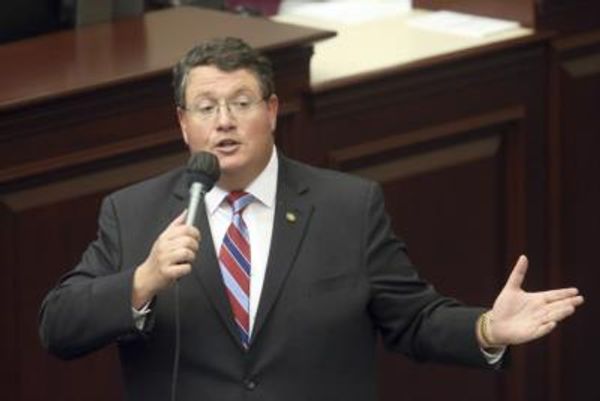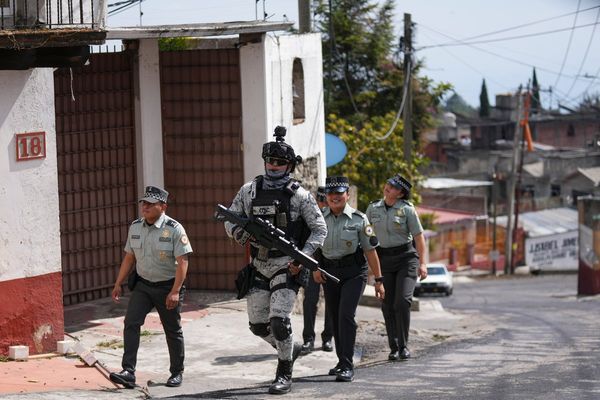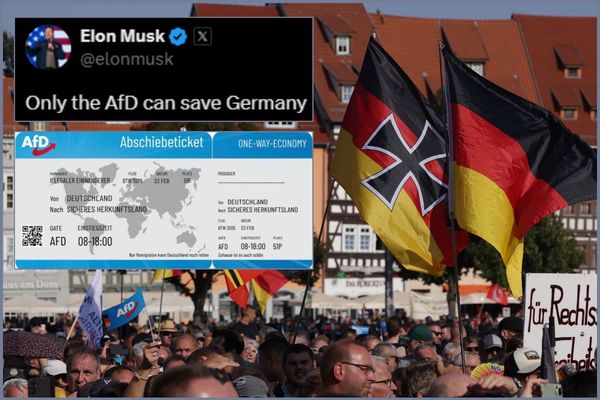Kyiv has rejected an offer from Moscow to create “humanitarian corridors” allowing civilians to flee six heavily bombed Ukrainian cities after it emerged that most of the supposedly safe routes led directly to Russia or its ally, Belarus.
The Russian offer came before a third round of peace talks. The Kremlin spokesperson, Dmitry Peskov, said in advance of the discussions that Moscow was ready to halt operations “in a moment” if Kyiv met a list of conditions. These included ceasing military action, changing its constitution to ensure neutrality, acknowledging Crimea as Russian territory and recognising the self-proclaimed republics in Donetsk and Luhansk as independent states.
As Russian forces continued their brutal bombardment on the 12th day of the conflict, shelling of the six cities – which include Kyiv, Kharkiv and the southern port city of Mariupol – continued to prevent civilians from leaving.
Posting a video online on Monday night the Ukrainian president, Volodymyr Zelenskiy, said he would be staying in Kyiv “as long as it takes to win this war”.
“I’m not hiding,” he added. “I’m not hiding and I’m not afraid of anyone.”
Accusing Moscow of “cynicism”, Zelenskiy also said Russian troops destroyed buses that were due to evacuate civilians from the combat zones. The Ukrainian leader said Russian forces mined the road chosen to bring food and medicine to the besieged city of Mariupol in southern Ukraine.
But he added that Kyiv would continue to negotiate with Russia to reach a peace deal.
Zelenskiy with another video from his office in the heart of Kyiv.
— Shaun Walker (@shaunwalker7) March 7, 2022
Not many presidents would still be there and not in a bunker, on the 12th day of an invasion, with multiple intelligence reports of hit squads out to get him.
His resilience is proving hugely inspiring here. pic.twitter.com/RCa8dnf8jS
Multiple attempts to evacuate over the weekend were swiftly abandoned when civilians trying to reach safety came under fire.
Under the Russian offer, only two of the proposed corridors would end up in Ukrainian territory. The French president, Emmanuel Macron, accused his Russian counterpart, Vladimir Putin, of “moral and political cynicism” and hypocrisy for making promises to protect civilians so they could flee only to Russia. “I do not know many Ukrainians who want to go to Russia,” he said, adding that full ceasefires to protect civilians were needed, not corridors.
Russia has made significant advances in southern Ukraine as it seeks to block access to the Sea of Azov and establish a land corridor to Crimea. But elsewhere progress has become stalled, including an immense military convoy that has been almost motionless for days north of Kyiv.

The Pentagon on Monday said in its latest assessment of the war it believed Russia had now committed almost 100% of the forces it had amassed for the Ukraine invasion and launched more than 625 missiles, but still deemed Ukrainian airspace contested the country had most of its fixed wing aircraft and air defences intact. “We’re not seeing a lot of progress,” a senior US defence official said, attributing it to a combination of stiff Ukrainian resistance and “internal challenges” within the Russian forces. As the ground offensive stalls, the Pentagon said the Russians were relying more on rocket and missile attacks from a distance.
It added Russia was now also trying to recruit foreign fighters, especially Syrians, to take part in its war in Ukraine, though there was no evidence of Syrian fighters actually arriving in Ukraine.
Both US and Ukrainian officials cautioned that Russia still has more combat power available to it, however – including the overwhelming bulk of its air power. Ukraine’s general staff warned that Russian forces were now “beginning to accumulate resources for the storming of the capital”, a city of more than 3 million people.
The UN human rights office has reported 406 confirmed civilian deaths but said the number was a vast undercount. On Monday, the bodies of at least 13 civilians were recovered from rubble in the town of Makariv, in the Kyiv region, after a bread factory was hit by an airstrike, while the mayor of Gostomel, a town north of Kyiv which is home to a crucial military airfield, was shot dead by Russian forces along with two other people. They were “distributing bread to the hungry and medicine to the sick”, local officials said.
An estimated 1.7 million refugees have left Ukraine since the war began in Europe’s biggest refugee crisis since the second world war. Many millions more have been displaced internally or trapped in cities being brutally pounded by Russian bombardment. Housing blocks, town halls, schools, universities and hospitals have been hit by missile strikes and artillery fire, with some areas reduced to rubble. The mayor of Lviv, Andriy Sadoviy, said the western Ukrainian city had reached the limits of its capacity and appealed to international organisations for help.
The third round of broad ceasefire talks between the two sides was held on Monday, but with Putin vowing to achieve the “neutralisation” of Ukraine “through negotiation or through war”, hopes remain low for any meaningful breakthrough.
Under the Russian offer of humanitarian corridors, only two of the proposed routes leading out of the six cities – Kyiv, Kharkiv, Sumy and the southern urban centres of Mariupol, Volnovakha and Mykolayiv – would end up in Ukrainian territory.
A spokesperson for the Ukrainian president, Volodymyr Zelenskiy, described the proposal as “completely immoral”. Ukrainians should have the right “to evacuate to Ukraine”, the spokesperson said. “[Russia] wants to supply humanitarian aid for pictures on TV, and wants the corridors to lead in its direction.”
Zelenskiy himself asked the international community to boycott Russian exports and urged a halt to all supplies to Russia. “If they do not want to comply with civilised rules, they should not receive goods and services from civilisation either,” the Ukrainian president said. “Let the war feed them.”
The foreign ministry said continued Russian shelling, including of residential areas, was “preventing the safe passage of humanitarian columns … as well as the delivery of medicines and food”. It called on foreign leaders to force Russia to observe an immediate ceasefire.
The International Committee of the Red Cross (ICRC) said attempts over the weekend to evacuate some of the 200,000 refugees trying to escape the besieged southern city of Mariupol using a so-called refugee corridor were rapidly aborted as it became clear the road they were being directed towards had been mined.
Civilians came under fire as they tried to leave many other areas including the Kyiv suburb of Irpin, where two adults and two children were killed when a shell hit them. Responding to the incident, Zelenskiy, accused Russian forces of “deliberate murder”.

The UK defence ministry said on Monday the Russian tactics appeared to be “an effort to break Ukrainian morale”. British military officials have compared Russia’s tactics to those Moscow used in Chechnya and Syria, surrounding and pulverising cities.
Western allies have imposed unprecedented sanctions against businesses, banks and billionaires in an attempt to choke the Russian economy and pressure Moscow to halt its assault, but Putin has equated global sanctions with a declaration of war and warned that Kyiv’s intransigence was “putting in question the future of Ukrainian statehood”.
The Russian rouble, however, slumped to new record lows against the dollar and euro on Monday, losing over a third of its value so far this year. Dozens of major companies have severed or severely limited their ties with the country and global share prices plunged on Monday after Washington said it was considering extending its sanctions to Russia’s energy exports.
Kyiv continued to call for Nato to impose a no-fly zone over the country but the alliance has repeatedly warned that this would bring it into direct conflict with Russia, and Putin has threatened “colossal and catastrophic consequences” if the west attempts to keep Russian planes out of Ukrainian skies.
The US secretary of state, Antony Blinken, however, said Washington was “working actively” on a deal with Poland to supply it with American jets. Blinken on Monday assured the former Soviet republics of Estonia, Latvia and Lithuania of Nato protection should Russia decide to expand its military campaign.
The World Health Organization (WHO) confirmed nine attacks on health care infrastructure in Ukraine since the start of the invasion on 24 February. The UN described a psychiatric hospital 60 km (40 miles) from Kyiv running out of water and medicine with 670 people trapped inside, including bedridden patients.







